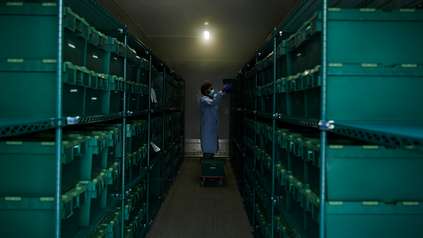SIREN study expands surveillance of respiratory pathogens ahead of winter
The UK Health Security Agency’s flagship SARS-CoV2 Immunity and Reinfection Study (SIREN) is entering a new phase working with NHS sites to provide surveillance of respiratory infections in healthcare workers for the 2023 winter season. This next phase will be known as SIREN 2.0 and began in September 2023.
Established at the height of the pandemic in June 2020, SIREN has continually tested healthcare workers across the UK for COVID-19, providing crucial information relating to the virus. The evidence it has collected on immunity, vaccination and emerging variants played a critical role in informing the national response.
The study introduced testing for Influenza and Respiratory Syncytial Virus (RSV) for healthcare workers, to help gather an understanding of the impact of these viruses on winter pressures in healthcare in Winter 2022 and this will continue this year.
The emergence of the BA.2.86 variant has resulted in the autumn booster campaign being brought forward. SIREN 2.0 testing of healthcare workers, a cohort eligible for the booster vaccine, will help provide answers on vaccine efficacy against this new variant, other circulating variants and infection-acquired immunity.
SIREN 2.0 will recruit participants from its original cohort of 45,000 healthcare workers, which remains the largest study of its kind globally, and it has expanded its collaborations with the Wellcome Sanger Institute and the World Influenza Centre (WIC) to ensure they continue to address important scientific questions.
“Thank you to all of our participants who make this crucial study possible. It is because of you that we have been able to collect vital data and insights on COVID-19 across the pandemic, furthering our understanding on immune response and the protection offered by vaccines
“This new phase of the study – SIREN 2.0 – will allow us to play a core role in the continued surveillance of COVID-19, including the detection of emerging new variants, while we will also utilise multiplex testing to assess the impact of influenza and RSV on healthcare workers.
“I am delighted that we will be working with new partners from the World Influenza Centre (WIC) and the Respiratory Virus and Microbiome Initiative (RVI) at the Wellcome Sanger Institute as we continue to answer the most important questions on the impact of respiratory diseases.”
Susan Hopkins, Chief Medical Adviser at UKHSA
The Wellcome Sanger Institute will sequence samples provided by UKHSA and use metagenomics to investigate other pathogens that cause respiratory infection such as parainfluenza. Meanwhile, SIREN plans to share influenza virus strains identified during the study with WIC, and these may be used to design influenza vaccines for future seasons.
“We are excited to be working with the SIREN study team to maximise the yield of science that can be done using the samples taken from the SIREN participants, which provide a unique opportunity to study respiratory virus infections in healthcare workers.
“The Respiratory Virus and Microbiome Initiative builds on the technology used for the genomic surveillance of SARS-CoV-2 during the pandemic. Using SIREN samples, we will monitor genetic changes in respiratory viruses as they circulate – including influenza virus and RSV, and seasonal coronaviruses. We hope that by expanding the range of respiratory viruses that are routinely sequenced we can contribute to scientific understanding that will help prevent and treat infections caused by respiratory viruses.”
Dr Ewan Harrison, Head of the Respiratory Virus and Microbiome Initiative (RVI) at the Wellcome Sanger Institute
Blood samples from SIREN participants are already being tested in partnership with UKHSA’s newly established Vaccine Development Unit (VDEC) to understand the immune response provided by vaccination against new variants, including BA.2.86, providing vital evidence to inform the national risk assessment.
The team will continue to assess the durability of protection of vaccination in their healthcare worker cohort, and will provide regular updates to experts, including the Joint Committee on Vaccination and Immunisation (JCVI), and policymakers on the latest findings.
More information
This announcement was originally published by UKHSA on 14 September 2023.
Respiratory Virus and Microbiome Initiative
The Respiratory Virus and Microbiome Initiative (RVI) at the Wellcome Sanger Institute is working to develop DNA sequencing and analysis platforms to track the transmission and evolution of respiratory viruses (including influenza virus, respiratory syncytial virus, and SARS-CoV-2) and understand their interactions with other microbes in the human respiratory tract. By developing approaches for sequencing all microbes in a sample, researchers aim to develop tools to identify new viral threats as part of an early warning system to help prevent future pandemics.
Once these techniques are developed, the Sanger Institute’s Genomic Surveillance Unit (GSU) will scale up the products that will enable public health partners to track, in near-real-time, exactly which variants of influenza, respiratory syncytial virus (RSV) and SARS-CoV-2 are circulating.
The Wellcome Sanger Institute
The Wellcome Sanger Institute is a world leader in genomics research. We apply and explore genomic technologies at scale to advance understanding of biology and improve health. Making discoveries not easily made elsewhere, our research delivers insights across health, disease, evolution and pathogen biology. We are open and collaborative; our data, results, tools, technologies and training are freely shared across the globe to advance science.
Funded by Wellcome, we have the freedom to think long-term and push the boundaries of genomics. We take on the challenges of applying our research to the real world, where we aim to bring benefit to people and society.
Find out more at scion-02.sandbox.sanger.ac.uk or follow us on Twitter, Instagram, Facebook, LinkedIn and on our Blog.
The World Influenza Centre
The World Influenza Centre (WIC) at The Crick Institute is one of six centres in the world responsible for analysing influenza viruses circulating in the human population, overseen by the World Health Organisation (WHO).
WIC monitor flu strains around the world and inform vaccine development, working within the WHO Global Influenza Surveillance and Response System, consisting of over 150 laboratories and institutes worldwide.




